There are basically two ways to get from Kashgar to Kyrgyzstan: the
Torugart pass and the
Irkeshtam pass. The Torugart pass is arguably more scenic and takes you past the Tash Rabat caravenserai on the way to Naryn, but it's a very difficult route to take because China requires a special permit and guide to take you on this route, which effectively means you have to arrange for private transportation with a tour agency. The Irkeshtam pass is much more heavily traveled, and is served by a once- or twice-weekly international bus running between Kashgar and Osh, with tickets running close to $100.
In 2012, it was also possible to hitch-hike over the border. In order to do so, you would take a share taxi or minibus to Ucha/Wuqia/Ulugqat from Kashgar's international bus terminal, then go to the Chinese customs point in Ucha, where you would be stamped out of China (despite being about 135 km from the actual border) and put onto a truck by Chinese customs officials. You would then take the slow and bumpy ride to the border, which can take up to 6 hours because of the roadwork that limited your speeds to as low as 20 km/h. After that, cross into Kyrgyzstan and then either take a share taxi from the border to Osh or Sary Tash, or jump back on the truck and make it to Osh the next day.
I decided to try this, as it was better than waiting for the bus (which is reported to be quite bad) and braving the multi-hour waits to buy tickets at the international bus station. If you're trying to do something similar today,
Caravanistan and
Far West China have all the details: the short story is that you absolutely need to take a taxi between Ucha and the border.
Road to Ucha/Ulugqat
When you arrive at the international bus station, there will be huge lines (I estimated it would take 6 hours to get to the front of the line, as I waited in one before realizing I didn't have to), but you don't need to wait in them in order to go to Ucha. Instead, head out of the doors and into the courtyard behind the station: although someone will check you for a ticket, just tell them you're going to Ucha/Wuqia/Ulugqat, and they'll let you through. At the back left, there should be a stand with the Chinese characters for Ucha. I paid 60 yuan for the ride to Ucha in a share taxi, which is apparently a huge overpay, but then again there were only three of us.
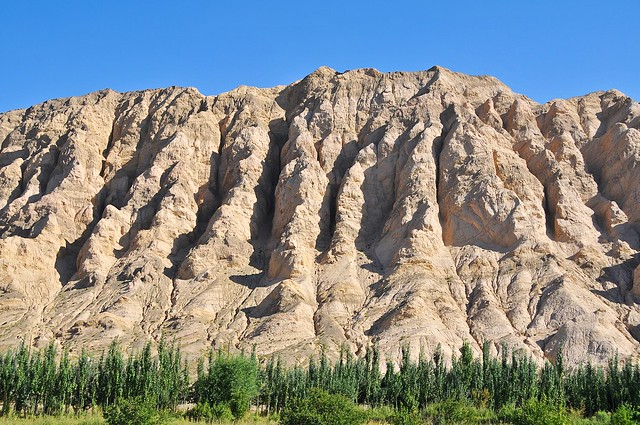 |
| Not far outside Kashgar. |
 |
| Views like this make me regret taking so many night buses and trains. |
 |
| Note the stone buildings and pens on the left. |
Ucha
 |
| A park on the outskirts of Ucha, towards the border facilities. |
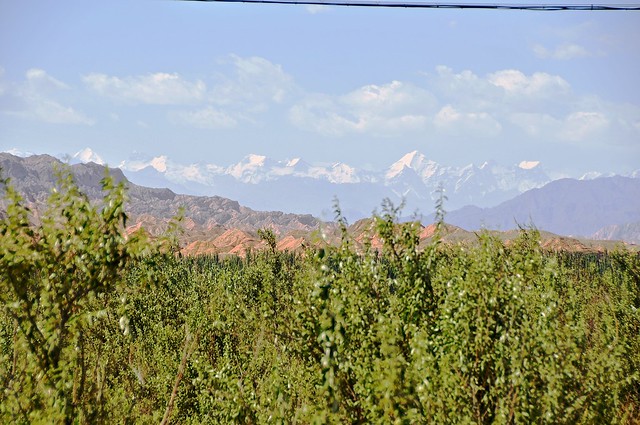 |
| The mountains in the distance are the same ones that were next to Bulungkul, along the Karakorum Highway. |
 |
| A cemetery and tombs on the southern edge of the highway. |
It took me a while to find the border and customs buildings. They're not on the main highway, as I had expected, but in a compound north of the highway. And as you enter the compound, there aren't any signs saying which building is which, and everything was pretty dead when I arrived. I ended up going to the customs building, which in fact was the wrong building to go to. But because this was after 1:30, they were on siesta until 4:00 so I didn't realize I was in the wrong place until 4:00. But really not until about 4:30, as the officers behind the booths ignored me as I stood there for a while before finally giving me a couple of minutes to tell me I was in the wrong place. Great.
When I arrived at the correct building, I was finally told that they wouldn't let me through in the afternoon, and that I would have to come again the next morning. Holy shit balls. This was a problem given that I didn't see any hotels in Ucha and I since I had been effective in spending almost all my yuan I didn't have much money left over for a the kind of hotel that would accept foreigners (if any existed in Ucha, which I very much doubted) in any case.
From the roundabout where the taxi dropped me off to the customs & immigration post. Use the satellite imagery, not the map.
I ended up sleeping in a park that night. Or trying to sleep, since it got quite cold that night even though we were only at about 1,500 meters. This was a bit surprising, since Kashgar was so hot that many people were sleeping outside on the hostel balcony in an attempt to escape the heat. After repeatedly shivering myself awake I stopped even trying to sleep.
 |
| Looking south down the main street. |
 |
| After a 180°, looking north at the main traffic circle. |
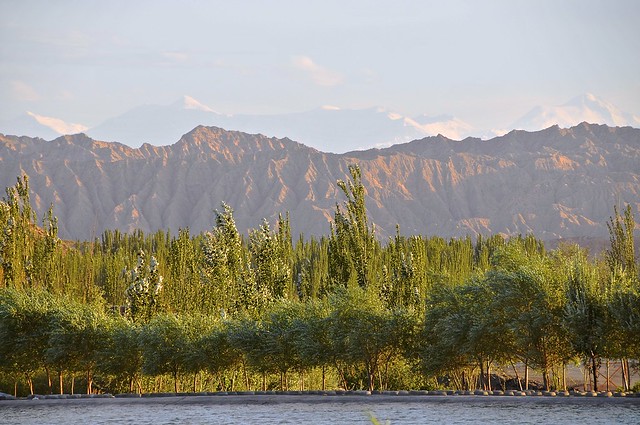 |
| View from a park south of town, with high alpine mountains behind the low desert mountains that surround the town. |
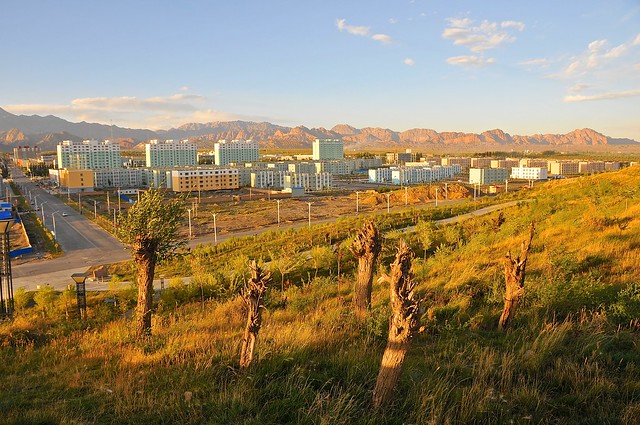 |
| Evidence of the building boom. I suspect Ucha is on the vanguard of Han colonialism, with Han immigrants rushing in to new cities and taking all the new jobs created by the resource boom and whatever the heck else is fueling development, while the Uyghur are relegated to the subsistence-level sectors they're currently engaged in. |
 |
| Hill-top pagoda. |
 |
| Pretty nice views. |
 |
| I'll take this over the hustle and bustle of Beijing or Shanghai any day. |
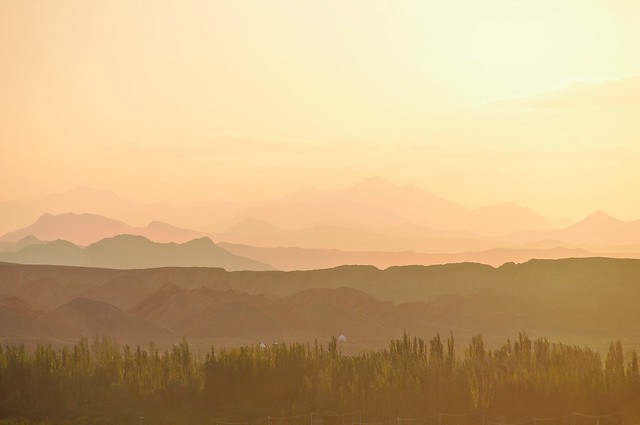 |
| Layers and layers of mountains. |
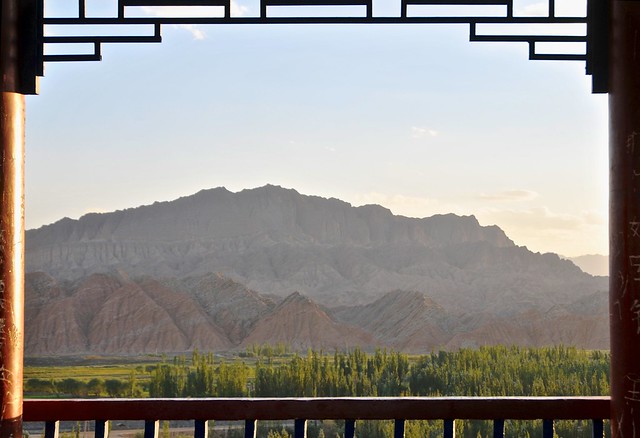 |
| Such a pretty country. |
While killing time and reading at the pagoda, a few mothers and their kids showed up, along with a younger Uyghur guy. They were curious, and I let them borrow my camera since they were interested in it. The Uyghur guy used it to take pictures of the girls, while gesturing that he liked the ass of one of them. Hmm.
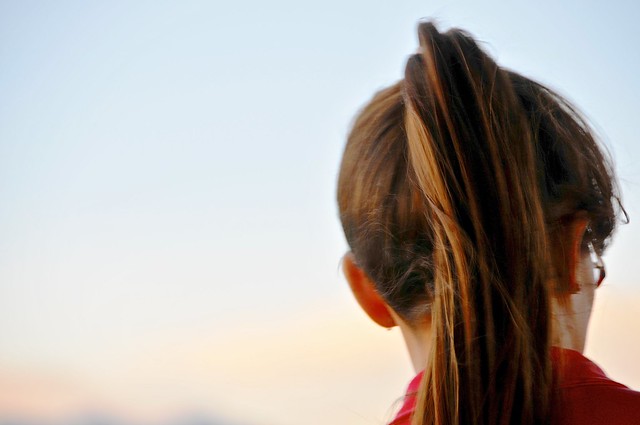 |
| Uyghur-made photograph. I may have deleted one of her ass. |
 |
| The Uyghur guy took this picture. I'm having trouble determingin the ethnicities, since they all look Chinese to me, but the girl in the headscarf is dressed like a Uyghur, as is the girl in the red dress. |
 |
| Those eyes! |
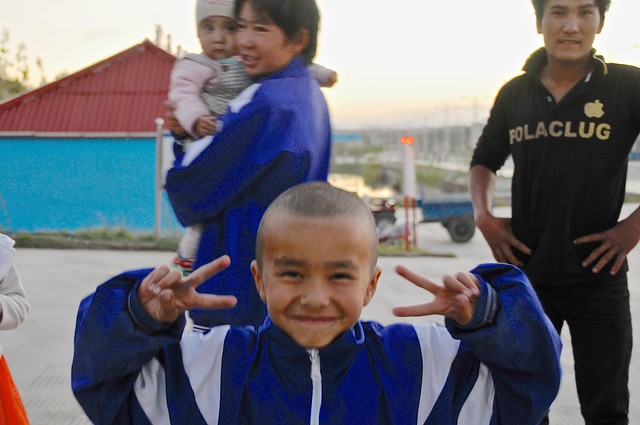 |
| This kid had character. He and the Uyghur guy had their own little war going on, as both of them effectively fought over my camera. It's only later that I wondered if this hostility by the Uyghur, which I had earlier dismissed as petty, wasn't a conscious or intentional form of anti-Han hostility. |
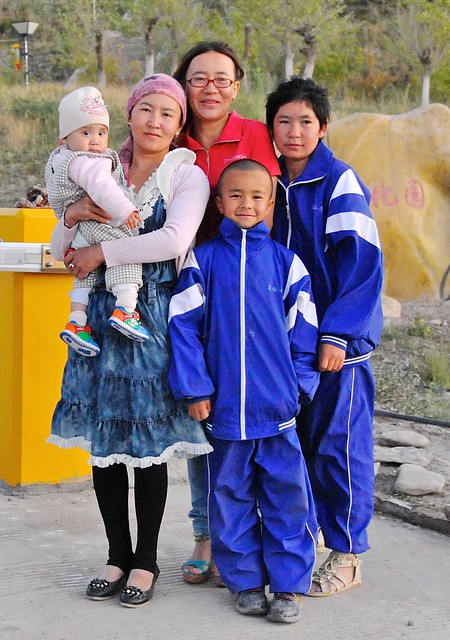 |
| Heck, I can't even tell who is related to who, and how. |
 |
| The park at night. I slept in a concrete ditch nearby. |
 |
| Drifting clouds. |
 |
| The full moon. |
 |
| The park in the morning. |
On the Truck
When I returned to the border point in the morning, after spending the rest of my yuan on some snacks and some cigarettes to give to the driver I hitched with, I was stamped out of China without any difficulty. But when I made it to the outside of the building, I was told that I would have to wait until the bus to Osh arrived, and that I would not be allowed to hitch. Well, I passed the morning waiting for the bus, and kind of hoping that there wouldn't be one. As the time passed, and the time for the afternoon siesta approached, the customs official relented and said that he guessed there wouldn't be a bus that day. I was put on the next truck, with a cheerful Uyghur driver.
This doesn't happen anymore. Now, if you're at the checkpoint, you have to hire a taxi to the border—cyclists included. Thankfully, since the road is now paved, the four hour trip takes less than two, and the fare for an entire taxi is about 400 yuan—100 yuan each if you split it.
Anyway, when I was on the truck, the first little stretch was pretty easy, and we stopped for the driver to buy some peaches which he shared with me, and I gave him a few packs of cigarettes. As we continued the road got worse, and although we were going pretty slow it probably wouldn't have been much fun to be in a car going faster.
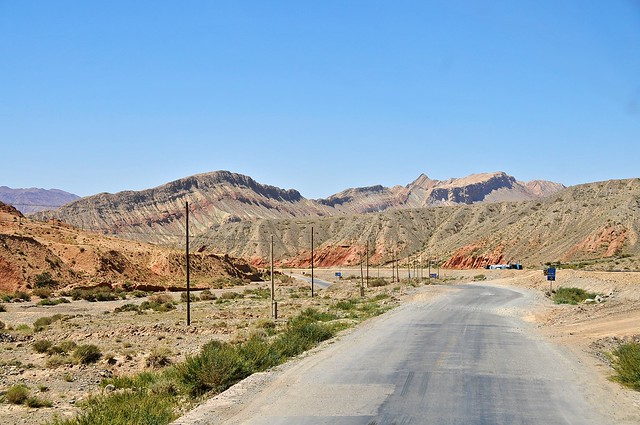 |
| A rare stretch of proper tarmac. We only saw one accident on the road, with an overturned trailer, but it
almost made the road impassable as trucks had to try and divert around
it without overturning. |
 |
| I love the landscape. |
 |
| Not hard to believe they find dinosaur fossils in the mountains. |
 |
| Red mountains by the Red River. |
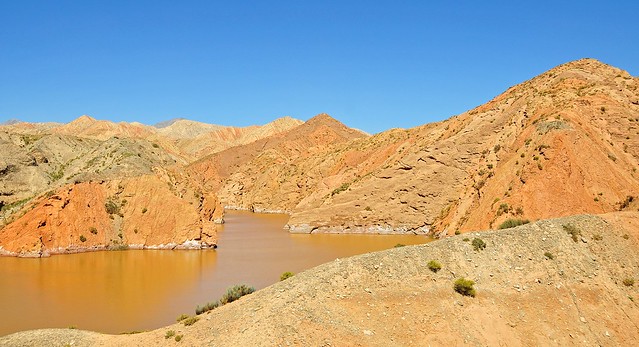 |
| There were some surprising lakes in the mountains. |
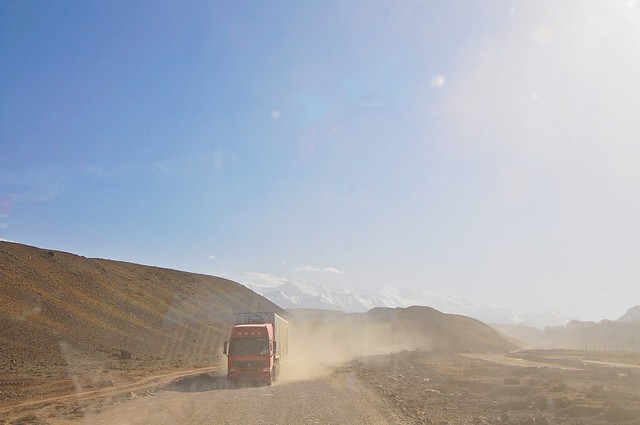 |
| Nearing the border—you can tell from the snow-capped Trans-Alay mountains in the background. We went most of the way with our windows open (which was obviously good for taking pictures), but whenever we passed anyone or were closely trailing anyone we had to put the windows up, for reasons which are obvious in this picture. |
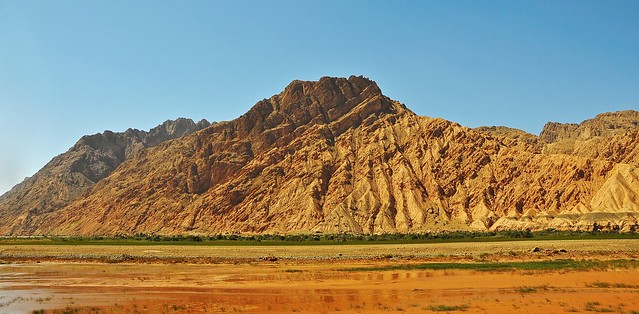 |
| The western Kyzyl-suu (red water) or Kizilsu river lives up to its name. |
 |
| Lineup at the border. |
 |
| Grassy bluffs over the Kyzyl-suu are typical Kyrgyz jailoo (high mountain pasture) scenery. |
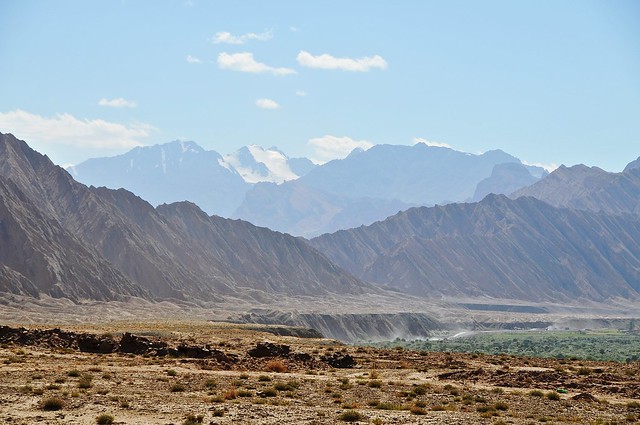 |
| The road is down in the valley; I climbed up here to take a picture while all the trucks were queued up. All of a sudden the trucks started up and began to move, so my first instinct was to run back to the truck. I took a hard fall and really banged up my knee, which I could barely bend when I arrived in Osh some six hours later. |
We made the border in about three and a half hours, which comes down to an average speed of about 45 km/h, with an elevation gain of about 1,000 meters. As we made the border, the driver said that the trucks would have to wait in line for a while, and that it would be much faster if I simply walked to the Kyrgyz border checkpoint, and that if I wasn't able to find a ride to Osh I could just wait for him and he would drive me the rest of the way. I thanked him for his help and hospitality, and walked to the immigration post.
I had no idea what to expect at this border: corrupt, unfriendly guards, confusion over the new visa-free policy, delays and red tape, or what. It turns out that the Kyrgyz officials were extremely friendly and welcoming, using their broken English and making jokes. Such a difference from typically-surly Chinese officials. As I was leaving the passport-stamping building, the officials there telephoned ahead to the guard at the entrance to the border area to have him find a taxi going to Osh for me. I immediately thought it was some sort of scam to put me in an overpriced taxi and get a kickback, but the guard at the last outpost simply pointed out a taxi driver to me, and there was no pressure or anything. As it was pretty late and there weren't likely more cars going to Osh, I agreed to the price of 1,000 som to Osh, which was a reasonable price based on the research I had done. After waiting for half an hour or so to pick up more passengers and fill the van, we left for Osh.
Share taxi from Irkeshtam to Osh
Shortly after entering Kyrgyzstan, the scenery changed substantially, as did the road. Instead of being on a bumpy road through rocky mountain deserts, we sped along on smooth new roads as we climbed into a high, wide mountain valley full of grasslands. The roads all the way to Osh were new and perfect the way most Chinese roads are: apparently the Asia Development Bank financed the re-paving of the M41 between Osh and Sry Tash, as well as the east-west road through the Alay valley connecting the Irkeshtam border with Sary Tash, and from there to the Tajik border at Karamyk—the only section not rebuilt was the stretch of M41 running south from Sary Tash to the Kyzyl Art border with Tajikistan.
With the exception of a short trip down and back up a river valley on a switch-backed stretch of road, the road to Sary Tash was just miles and miles of grassy patures and and distant mountains. The girls in the minivan, who had been dressed something like conservative Uyghur girls when we started, began to change their clothes and dress as we drove: off came the headscarves, on went the makeup, and conservative outer garments were shed until they were in the global uniform of jeans and tight T-shirts. This should have been the first hint of changes to come, but at the time I just chalked it up to girls going to the city and getting out from under their parents' thumbs.
 |
| Looking south (through tinted windows) over the Alay valley at the Trans-Alay mountains that form the border with Tajikistan. notice how brown the grasses are up here, even though it is no higher than Tashkurgan, at about 3,600 meters. |

The sun went down around Sary Tash, which marks the point where you
exit the wide Alay valley and head north through the narrow mountain
valleys and passes on the way to Osh. I'm probably a little lucky it was
dark by then, as otherwise I might have been nervous about how fast we were
going in the darkness—especially since this Osh-Sary Tash stretch of the
M41 is usually pockmarked with a recent burned-out truck wreck or two
(one of which we also saw in the Alay valley before it got dark, and which I assumed was an old wreck, though I later realized it was most likely very recent).
It was on the dark ride to Osh that the second hint of things to come arrived: the non-stop Russian pop being played by our driver. This was a big surprise, as the music in Xinjiang matched the drinks: decidedly non-Western and deeply influenced by the Muslim world. I really have no basis for proper comparison, but the music was what I imagined it would be like in Pakistan, Afghanistan, Saudi Arabia, Yemen, or somewhere like that.
The Russian power pop carried us safely into Osh, and the taxi driver asked where I wanted to be dropped off. I
said the Osh guesthouse, which the driver knew, and he called ahead and
reported that it was full. After driving around the city and dropping
off the other passengers, I asked to be dropped off at the Alay Hotel,
which he also knew.
He was going to go inside to check if they had space, but I was still suspicious of inflated prices and kickbacks so insisted it wasn't necessary. I needn't have worried. The final complication was when it came to paying, as I had no som and only had US dollars. 1,000 som is about $22, so I paid with $40. Paying in dollars threw him for a bit of a loop, but after consulting with his phone he gave me 800 som in change, showing me the math on his phone, and giving me an exchange rate of 45 som. It turns out that this is a better rate than I could have expected, as the best moneychangers were only giving about 47 som, and then only on transactions of at least $100. This kind of straightforward dealing became the norm, and not the exception, in Kyrgyzstan—the only complication being when you initially bargain for the price of something, but after that being established the locals tend to be scrupulously helpful, with rare exceptions.
The hotel Alay was a super deal at 400 som, since this was about what I was used to paying for a dorm room in China. The hotel Alay was also my introduction to Russian-style hotels, where there is a resident floor attendant (invariably female) on every floor. They don't seem to do a whole lot, but they can usually get you hot water or unlock the bathroom and shower if you need it. I suspect they were intended as much to keep an eye on you as to take care of you.
I made a short sojourn to the streets around the hotel and popped into a small convenience store. I made a few purchases to get a rough idea of pricing in Kyrgyzstan: a bottle of Pepsi and some wafers (very popular in former Soviet states) ran me 40 som, or about 85¢ at the time, or about 66¢ in 2014.
Budget
August 30, 2012, from Kashgar to Ucha: 113 yuan
- Share taxi to Ucha: 60 yuan
- Drinks: 18 yuan
- Socks, snacks, yoghurt: 20 yuan
- Dinner: 25 yuan
August 31, from Ucha to Osh: 45 yuan, 1440 som
- Snacks, drinks, and cigarettes (for driver): 45 yuan
- Hotel Alay: 400 som for a private room with shared bathroom.
- Share taxi from border to Osh: 1000 som
- Soda and snacks: 40 som



































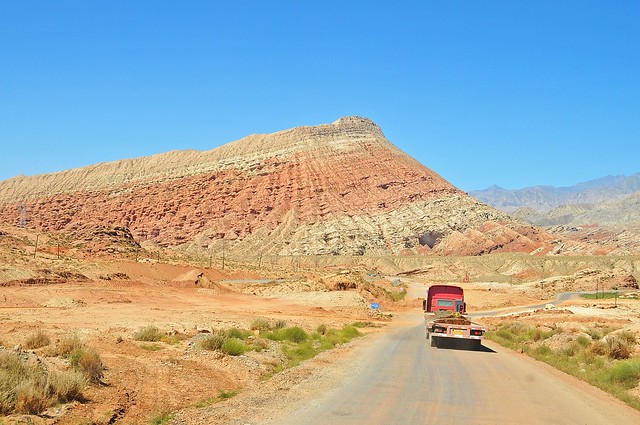

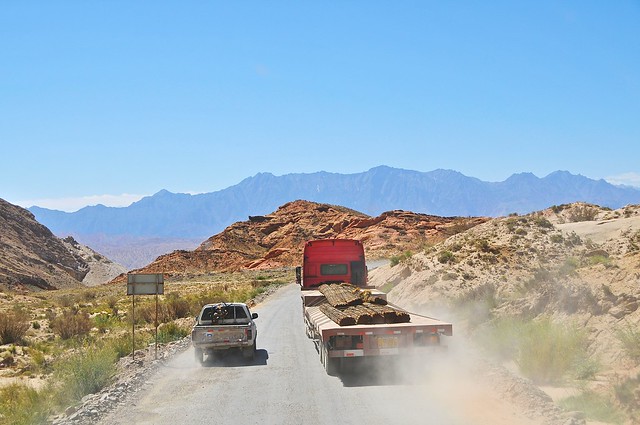



Excellent blog
ReplyDeleteI'm glad if it's been helpful. Unfortunately this specific post isn't as relevant as it once was, as they no longer let you hitchhike and the road has been fixed.
ReplyDeleteOf course, border process and prices are no more relevant, but your pictures are really great. From Ulugqat to Irkeshtam, the best I've been seeing on the web.
ReplyDeleteCongratulations.
Fabrice
I suspect that the current requirement that everyone take a (share) taxi along this section makes it more difficult to take pictures, especially now that the road improvements are complete and you go at normal highway speeds.
Delete